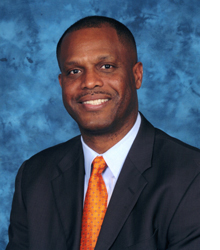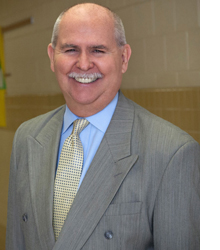A few dozen Wake County residents got its first look Tuesday night at the finalists for the Wake schools superintendent job.
The finalists presented their visions for the school system and answered questions from the audience in the Duke Energy Center for the Performing Arts.
Here is some information on each finalist, along with their remarks from the public forum.
Dana Tyrone Bedden
Age: 46

Education: University of Florida, bachelor’s degree; Pennsylvania State University, master’s degree in educational administration; Virginia Polytechnic Institute and State University, doctorate in educational leadership and policy studies.
Experience: Bedden began his educational career as a middle school teacher and coach for football, basketball and track. As a principal in Washington, D.C., at the School Without Walls Senior High School, his students maintained a 95-percent college admission rate. During his tenure as superintendent for the Richmond County School System in Augusta, Ga., the system’s graduation rate increased by nearly 14 percentage points.
Current position: Bedden is the superintendent of the Irving Independent School District in Irving, Texas. The district serves 35,111 students on 38 campuses.
A selection of quotes from Bedden at Tuesday’s forum:
“The fortunate opportunity for a superintendent is to be able to lead in a direction that serves children in the belief that all children can be successful. … I also believe that it’s the task of the next superintendent to provide some healing and relationship-building to bring together the community, to rally behind a school system that’s already a good school system, and can go back to being a great school system.”
On how to handle politics and how to advocate for Wake schools in the state legislature: “The reality is, they are in office because they were elected to be in office, and many times, they won’t stay in office. I think about how we can create win-win situations rather than a line in the sand. The relationship comes about from having regular conversations. … We have to connect the dots for our elected officials. … The end result is it’s about keeping children first. The question is how does this help our students, how to get our students into the workforce. Because education is about economic development.”
On magnet schools: “I sat down with every high school principal in our school system and asked, ‘What are you known for besides playing football?’ What are you known for in your school besides being a traditional institution? Now, every school has a signature program. … You have to partner with the community, with the business community. … We listen to them about what the workforce needs in the community. We’re creating a pipeline so they don’t have to go somewhere else and recruit.”
“We’re going to get back to making people feel like they’ve got a seat at the table, that they’ve got things done with them instead of to them. … The challenge is that we continue to do more with less, so people think that we can keep going with that. Instead, we need to think what we could accomplish, if we had what we should’ve gotten. And how much we can accomplish each and every day.”
Ann Blakeney Clark
Age: 55

Education: Davidson College, bachelor’s degree in English; University of Virginia, master’s degree in special education.
Experience: Clark began her career in Charlotte-Mecklenburg Schools as a teacher of behaviorally and emotionally disabled children in 1983 and has worked her way up for 30 years. She has held a variety of teaching and administrative positions, working her way up to being principal of elementary, middle and high schools. She was named National Principal of the Year in 1994.
Current position: Clark is the deputy superintendent for Charlotte-Mecklenburg Schools, the second largest school system in North Carolina.
Some quotes from Clark on Tuesday night:
“I believe that we can eliminate the [achievement] gap. … I believe we need to put a stake in the sand in Wake County and say we’re going to be the [best] district in the nation. You are the highest-performing district in the state of North Carolina. … And I believe, if we put that stake in the sand, if you look toward that North Star, and we focus on being the best district in the nation. Not because being the best is the goal, but because we can eliminate that achievement gap.”
On politics: “One could say that public education shouldn’t fall victim to partisan politics. But we need to remember that the government is structured as an elected body, and the funding comes from another elected body. So the reality is there’s going to be politics. I see my role as the superintendent to be the blocker and tackler for the district and to focus my time and energy on those relationships and build them while the teams at the school house and district offices focus on that stake in the sand in terms of keeping the focus on student achievement. I believe that if you put a face of a kid, a teacher, a principal, on every decision you make in the system… I believe you can make headway. It is hard to argue with the face of a child.”
“There are bills being passed, moved around in our state Capitol, that feel like popcorn popping some days. My worry is the collective impact. We’ve had a bill on class size. We’ve had a recommendation to reduce the number of teacher assistants, to reduce eligibility for pre-K. And yet we had a bill that talks about every third grader reading on grade level by the end of third grade to be retained. And you tell me how there’s a line across those bills. That’s the opportunity for a superintendent to step in and say, ‘We’ve got misalignment.’”
On magnet schools: “We have to tap into the entrepreneurial spirit of our principals. When we got our certifications for principals, we weren’t taught how to market and brand our schools. Our schools need the business community, folks across the district and community, to help our schools talk about what we want to be good at. … Charlotte is setting up an academy in every one of our high schools and our feeder schools, really tapping into the career possibilities for our students, begin to plant those seeds in middle school. Another thing we’ve created is a hub system – for students who are interested in horticulture, or cosmetology, or some of the trade industry.”
“My pledge that I will point us to that North Star of being the best district in the country. I also promise I’m going to use my rearview mirror. I’m going to invite everyone to help be my rearview mirror. You’ll need to remind me of the history, the values, the context, the reasons for decisions that have been made in the past. … There are going to be plenty of landmines for the next superintendent, but there are unnecessary landmines.”
James Merrill
Age: 62

Education: UNC-Chapel Hill, where he was a Morehead Scholar and received a bachelor’s degree in secondary English; Appalachian State University, master’s degree in education; Doctorate from UNC Greensboro.
Experience: Merrill began his career in 1973 as an English teacher, and served 16 years in the Wake County Public School System, most recently as associate superintendent for administration and finance. In 2000, he became superintendent of the Alamance-Burlington School System. In 2005, he was named North Carolina Superintendent of the Year.
Current position: Merrill has been superintendent of the Virginia Beach City Public Schools, the third largest school district in Virginia, since 2006.
From Merrill at the forum:
On racial disparities in suspension rates: “There’s a lot of suspension going on based on level 1 infractions. … They don’t warrant out-of-school suspension. They warrant everything but out-of-school suspension. … In a place as large as Wake schools, there’s a tendency to want to create a policy that’s bulletproof. I don’t think that’s feasible. A policy, I think, needs to have a baseline of suggestion for response. But it has to allow for principal discretion, common sense and choice.”
On politics: “We’re professional educators. We’re not politicians. In my experience, I’ve learned sometimes the hard way that if we tend to our business, if we tend to funding, transparency, accurate information – let the politicians work out the solutions that are beyond many of us anyway. When working with a funding organization, a linkage staff to staff, position to position – to always be talking, working through things – we never close the channels of communication, no matter what is stirring in the politics above that.”
On bullying: “Awareness is key. We hear, ‘Why, when I was little, that was just picking on somebody.’ No. Today, it’s much more vicious. … For teachers, the question is, ‘What would you report? How quickly would you respond?’ It’s increased expectation and responsibility, but one that we must follow up on. We need to investigate every instance. The one you don’t investigate, that might’ve been the one you needed to follow up on.”
On magnet schools: “The way the question was asked assumes that the magnet program is untouchable. That may not be so. It may best start with examining what the original goals of the magnet programs were, and is that still the need? Should we be experimenting with lifting the magnet program out of a couple schools to see what happens? It’s difficult for schools to find its own niche that’s a little bit more unique than everyone else, and that may become a little unreasonable after a while… One way to approach it would be to turn to each school that’s not a magnet, and ask, what do you need to increase your draw?
What do you need to balance the scale? And this is an equity issue between magnets and non-magnets. What would make a difference in your community?”